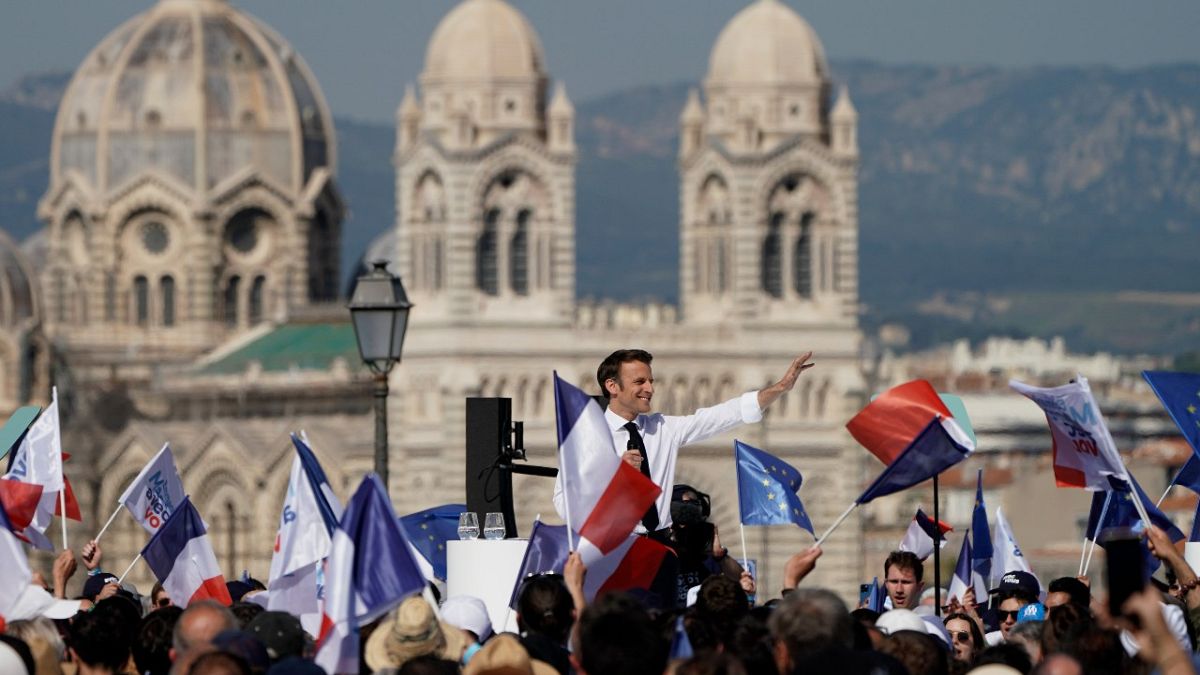The French president has promised to boost his climate policy by giving his prime minister direct responsibility for environmental planning, if he is re-elected.
Emmanuel Macron has promised that is he is re-elected, his prime minister will be "directly responsible for environmental planning", in order to go "twice as fast" to reduce greenhouse gas emissions.
Before a crowd of supporters in Marseille, he promised a "complete renewal" of his policy, saying he had "heard" the message of the first round.
The French president and centrist candidate, who faces a run-off next Sunday with Marine Le Pen, needs the support of left-wing voters to be assured of victory.
Crucial to the challenge are the votes of those who backed veteran left-winger Jean-Luc Mélenchon last weekend. He fell out of the race after finishing third — but won 22% of the vote, putting him within two points of ousting the far-right candidate.
In bright sunshine in the southern port city, Macron promised his supporters a prime minister "directly in charge of environmental planning", "supported by two strong ministers".
The first of these, he said, would become "minister of energy planning", tasked with a "mission of making France the first major nation to leave behind oil, gas and coal".
The second supporting minister would be "responsible for territorial environmental planning" to tackle local transport, "reinvest in river and rail freight", "accelerate the renovation of housing, at least 700,000 per year over the next five years", and also to "act for the quality of water, air, food".
Defending his record during his first term in office, Emmanuel Macron cited high-profile projects that had been scrapped, such as a new airport at Notre-Dame-des-Landes in western France, and a new Terminal 4 at Paris's Charles de Gaulle airport.
"We have been twice as fast as the previous two five-year (presidencies) in reducing greenhouse gas emissions. We have cut them by 12% in five years," he argued, promising to go "twice as fast" from now on.
"You know what? We're going to do it!" he said, attacking his rival Le Pen as "incompetent" and as a climate change sceptic.
According to the left-leaning think-tank the Jean-Jaurès Foundation, the defeated third-place candidate Mélenchon attracted particular support among 18-24 year-olds for whom environmental and cultural issues are important.
Marine Le Pen campaigned on Saturday in Saint Rémy-sur-Avre, a small town west of Paris where she came top in the election first round. The "Rassemblement national" ("National rally") candidate promised to lead France as a "mother", defending "the most vulnerable", if she was elected on April 24.
During her visit she was greeted by people who complained of high payroll taxes, poor housing, and a lack of support for market stallholders obliged to close during the Covid pandemic.
More than one raised the issue of Muslim headscarves, which Le Pen wants banned in public. She told reporters it was a "complex problem" and that she was "not obtuse", adding that her controversial proposal would be debated in parliament.
"We have to solve the problem of women who are obliged to wear (it) under pressure from islamists," she said.
Commenting on the closure of a factory in the region, Le Pen criticised "savage globalisation, a fools' market", promising to take account of "tens of millions of French people who have not been the priority" of previous governments.
Le Pen — whose anti-immigration stance includes discriminating against foreigners including EU citizens — also took a swipe at thousands of protesters who turned out in France against the far-right on Saturday.
"To come and demonstrate against the results of an election, I find that profoundly anti-democratic," she said. "I want to tell these people: go and vote then!" she added.
With a week to go till next Sunday's second round, an opinion poll by Ipsos Sopra/Steria suggests Emmanuel Macron leads Marine Le Pen by over 10 points among voting intentions, with 55.5% of the vote compared to 44.5% for his rival.
Other surveys have suggested a tighter race, which certainly looks set to be much closer than five years ago when Macron took two-thirds of the run-off vote to beat Le Pen to the presidency.












